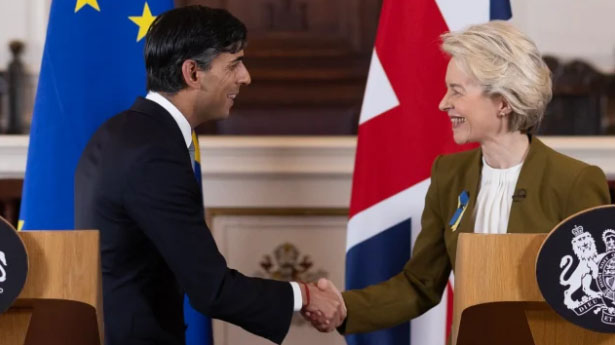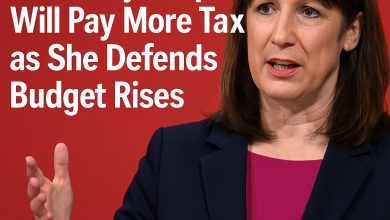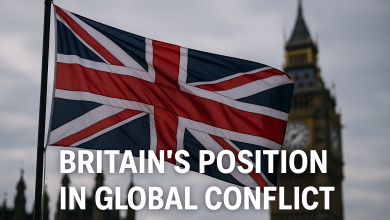Rishi Sunak is willing to confront the Democratic Unionist Party (DUP) over its power-sharing boycott in Northern Ireland, despite the DUP’s intention to vote against his “useless” Brexit proposal this week, according to sources.
DUP leader Sir Jeffrey Donaldson made plain on Monday that the party will reject the Windsor Framework in the Commons on Wednesday, while requesting “clarification, revision and rethinking”.
But, Downing Street stated that the Prime Minister has “no intentions” to renegotiate the accord.
No. 10 also feels that the possibility of resuming power-sharing isn’t dead since the DUP has historically softened its hardline stances over time and might therefore cancel its boycott over post-Brexit trade conditions.
But, a senior DUP MP claimed there was “no prospect” the party would abandon its reluctance to restore Northern Ireland’s democratic institutions unless major revisions were made to the agreement, adding that “the door remains firmly closed, locked, and barricaded.”
“We have seven conditions that must be satisfied, and we have never broken that pledge,” the MP stated.
The opposition of Northern Ireland’s largest unionist party threatens to swell the magnitude of an expected revolt of Tory MPs in Wednesday’s vote, however one opposition whip predicted that just about 20 would vote against the plan, falling far short of Mr Sunak’s majority.
The numbers might rise once the Tory arch-Brexiteer European Research Group (ERG) issues its legal judgement on the framework on Tuesday, but the deal will go through since Labour’s Sir Keir Starmer has vowed support.
The Government’s plan to limit the debate to 90 minutes and to limit the vote to legislation to apply the “Stormont brake” provision of the accord risks inflaming emotions even more.
The Prime Minister’s official spokesperson said holding a vote on the brake was the “correct method” since it enabled MPs “to have their say on the most critical aspect of the framework”.
Mr Sunak has attempted to sell the brake as giving unionists in Northern Ireland an effective “veto” over changes to EU law that apply in the region under its post-Brexit status of remaining in the European Union’s single market for goods as well as the UK internal market, which is required to maintain an invisible border with the Republic of Ireland.
But, the DUP’s stance appeared to harden on Monday when the legislation clarified that the UK Government, not members of the Northern Ireland Assembly, will have the last decision on whether EU regulations apply in the territory.
The legislation makes it clear that UK ministers can overrule Stormont’s attempts to use the veto in “extraordinary circumstances” or if they determine that the Brussels standards would not establish a regulatory border between Northern Ireland and the UK mainland.
DUP MP and senior whip Sammy Wilson claimed this rendered the brake “useless” and accused Northern Ireland Secretary Chris Heaton-Harris of having “misled in his assertion that the Government would be compelled to respond to opposition to EU law by [Northern Ireland] Assembly Members.
“The Windsor Framework has been oversold for weeks, and now the wildest assumptions are being exposed plain as its facts are reviewed and publicly published,” he stated after reviewing the law.
Meanwhile, Sir Jeffrey expressed worry that the brake would prevent Northern Ireland from disapplying current EU legislation in the area, despite the Government’s claim that this will be subject to a consent vote in the Assembly in 2024 under the original post-Brexit trade conditions.
Mr. Sunak’s spokesperson denied Mr. Wilson’s assertions, telling reporters, “It is up to MLAs in the Northern Ireland Assembly to determine whether to activate the brake… The rule in issue is then immediately stopped from taking effect if it is activated.
“The UK Government has an explicit veto to permanently disapply the regulation.”
Speaking directly to Mr Wilson’s views, a Government spokesperson added: “The legislation introduced today ensures ministers are obligated by law to trigger the Stormont brake promptly when the criteria are satisfied.
“Triggering the brake prevents the new EU legislation from taking effect in Northern Ireland.
“And we have gone even further today by providing a second level of protections so that ministers are bound to permanently veto the rule in the Joint Committee unless it has cross-community support; would not create new regulatory borders within the UK; or there are exceptional circumstances, such as the absence of an Assembly to provide a view.”






